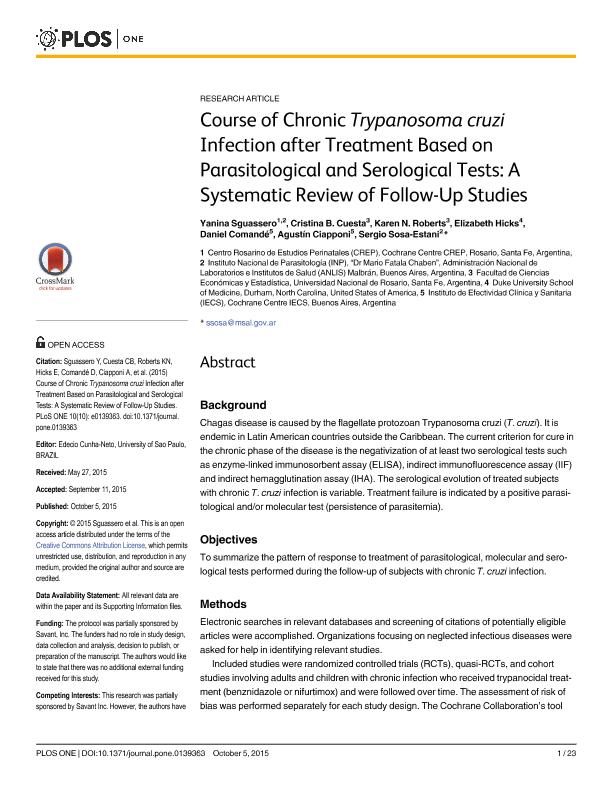Mostrar el registro sencillo del ítem
dc.contributor.author
Sguassero, Yanina

dc.contributor.author
Cuesta, Cristina B.
dc.contributor.author
Roberts, Karen N.
dc.contributor.author
Hicks, Elizabeth
dc.contributor.author
Comandé, Daniel
dc.contributor.author
Ciapponi, Agustín

dc.contributor.author
Sosa-Estani, Sergio Alejandro

dc.date.available
2018-04-16T17:09:20Z
dc.date.issued
2015-10
dc.identifier.citation
Sguassero, Yanina; Cuesta, Cristina B.; Roberts, Karen N.; Hicks, Elizabeth; Comandé, Daniel; et al.; Course of Chronic Trypanosoma cruzi Infection after Treatment Based on Parasitological and Serological Tests: A Systematic Review of Follow-Up Studies; Public Library of Science; Plos One; 10; 10; 10-2015; 1-23; e0139363
dc.identifier.issn
1932-6203
dc.identifier.uri
http://hdl.handle.net/11336/42144
dc.description.abstract
Background: Chagas disease is caused by the flagellate protozoan Trypanosoma cruzi (T. cruzi). It is endemic in Latin American countries outside the Caribbean. The current criterion for cure in the chronic phase of the disease is the negativization of at least two serological tests such as enzyme-linked immunosorbent assay (ELISA), indirect immunofluorescence assay (IIF) and indirect hemagglutination assay (IHA). The serological evolution of treated subjects with chronic T. cruzi infection is variable. Treatment failure is indicated by a positive parasitological and/or molecular test (persistence of parasitemia). Objectives: To summarize the pattern of response to treatment of parasitological, molecular and serological tests performed during the follow-up of subjects with chronic T. cruzi infection. Methods: Electronic searches in relevant databases and screening of citations of potentially eligible articles were accomplished. Organizations focusing on neglected infectious diseases were asked for help in identifying relevant studies. Included studies were randomized controlled trials (RCTs), quasi-RCTs, and cohort studies involving adults and children with chronic infection who received trypanocidal treatment (benznidazole or nifurtimox) and were followed over time. The assessment of risk of bias was performed separately for each study design. The Cochrane Collaboration’s tool and the guidelines developed by Hayden et al. were used. Two reviewers extracted all data independently. A third review author was consulted in case of discordant opinion. Additional analyses were defined in ad-hoc basis. Scatter plots for percentage of positive parasitological and molecular tests and for negative serological tests were developed by using the lowess curve technique. Heterogeneity was measured by I2. The protocol was registered in PROSPERO, an international prospective register of systematic review protocols (Registration Number CRD42012002162). Results: Out of 2,136 citations screened, 54 studies (six RCTs and 48 cohort studies) were included. The smoothed curves for positive xenodiagnosis and positive polymerase chain reaction (PCR) were characterized by a sharp decrease at twelve month posttreatment. Afterwards, they reached 10–20% and 40% for xenodiagnosis and PCR, respectively. The smoothed curves for negative conventional serological tests increased up to 10% after 48 months of treatment. In the long-term, the rate of negativization was between 20% and 45%. The main sources of bias identified across cohort studies were the lack of control for confounding and attrition bias. In general, RCTs were judged as low risk of bias in all domains. The level of heterogeneity across included studies was moderate to high. Additional analysis were incomplete because of the limited availability of data. In this regard, the country of origin of study participants might affect the results of parasitological and molecular tests, while the level of risk of bias might affect serological outcomes. Subgroup analysis suggested that seronegativization occurs earlier in children compared to adults. Conclusions: We acknowledge that there is a dynamic pattern of response based on parasitological, molecular and serological tests in subjects chronically infected with T. cruzi after treatment. Our findings suggest a trypanocidal effect in the long-term follow-up. Further research is needed to explore potential sources of heterogeneity and to conduct reliable subgroup analysis.
dc.format
application/pdf
dc.language.iso
eng
dc.publisher
Public Library of Science

dc.rights
info:eu-repo/semantics/openAccess
dc.rights.uri
https://creativecommons.org/licenses/by-nc-sa/2.5/ar/
dc.subject
Chagas
dc.subject
Trypanosoma Cruzi
dc.subject
Treatment
dc.subject
Systematic Review
dc.subject.classification
Salud Ocupacional

dc.subject.classification
Ciencias de la Salud

dc.subject.classification
CIENCIAS MÉDICAS Y DE LA SALUD

dc.title
Course of Chronic Trypanosoma cruzi Infection after Treatment Based on Parasitological and Serological Tests: A Systematic Review of Follow-Up Studies
dc.type
info:eu-repo/semantics/article
dc.type
info:ar-repo/semantics/artículo
dc.type
info:eu-repo/semantics/publishedVersion
dc.date.updated
2018-04-12T14:31:48Z
dc.journal.volume
10
dc.journal.number
10
dc.journal.pagination
1-23; e0139363
dc.journal.pais
Estados Unidos

dc.journal.ciudad
San Francisco
dc.description.fil
Fil: Sguassero, Yanina. Centro Rosarino de Estudios Perinatales; Argentina. Dirección Nacional de Instituto de Investigación. Administración Nacional de Laboratorio e Instituto de Salud “Dr. C. G. Malbrán”. Instituto Nacional de Parasitología "Dr. Mario Fatala Chaben”; Argentina
dc.description.fil
Fil: Cuesta, Cristina B.. Universidad Nacional de Rosario. Facultad de Ciencias Económicas y Estadística; Argentina
dc.description.fil
Fil: Roberts, Karen N.. Universidad Nacional de Rosario. Facultad de Ciencias Económicas y Estadística; Argentina
dc.description.fil
Fil: Hicks, Elizabeth. University of Duke; Estados Unidos
dc.description.fil
Fil: Comandé, Daniel. Instituto de Efectividad Clínica y Sanitaria; Argentina
dc.description.fil
Fil: Ciapponi, Agustín. Instituto de Efectividad Clínica y Sanitaria; Argentina. Consejo Nacional de Investigaciones Científicas y Técnicas; Argentina
dc.description.fil
Fil: Sosa-Estani, Sergio Alejandro. Dirección Nacional de Instituto de Investigación. Administración Nacional de Laboratorio e Instituto de Salud “Dr. C. G. Malbrán”. Instituto Nacional de Parasitología "Dr. Mario Fatala Chaben”; Argentina. Consejo Nacional de Investigaciones Científicas y Técnicas; Argentina
dc.journal.title
Plos One

dc.relation.alternativeid
info:eu-repo/semantics/altIdentifier/doi/http://dx.doi.org/10.1371/journal.pone.0139363
dc.relation.alternativeid
info:eu-repo/semantics/altIdentifier/url/http://journals.plos.org/plosone/article?id=10.1371/journal.pone.0139363
Archivos asociados
